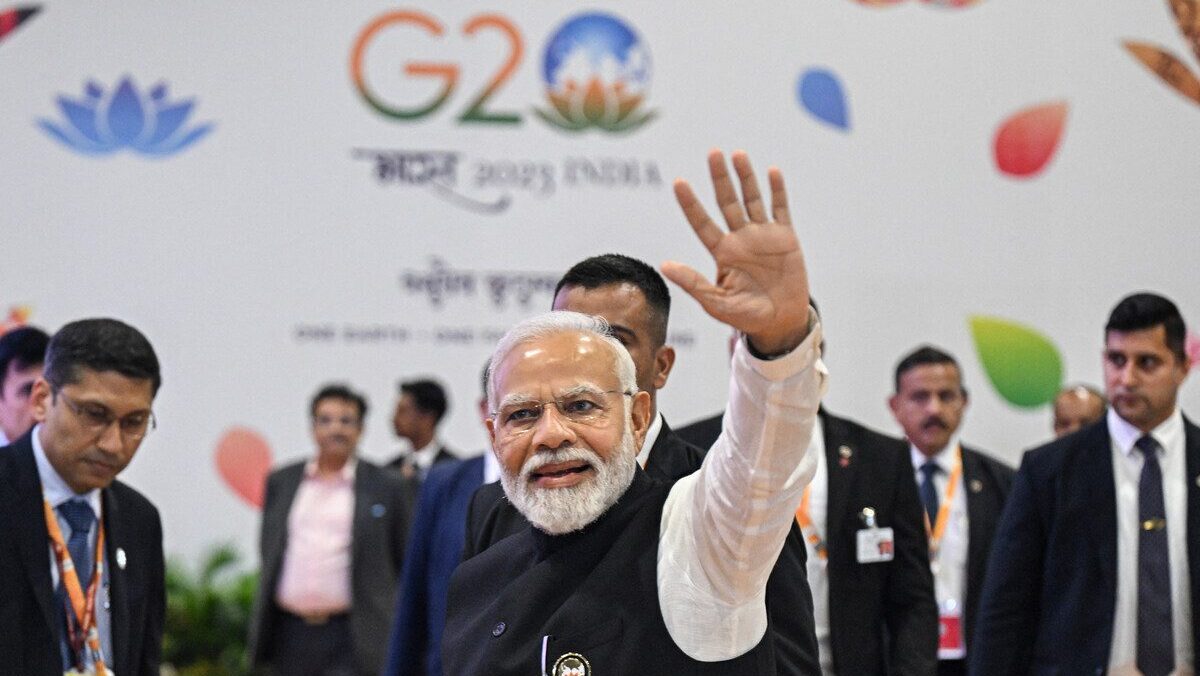
India’s Prime Minister Narendra Modi waves to the media representatives during his visit to the International media center, at the G20 summit venue, in New Delhi on September 10th, 2023.
Photo: MONEY SHARMA / AFP
While the war in Ukraine remains divisive among the G20 countries, against all odds, its leaders reached a final joint declaration at last weekend’s G20 summit.
As this year’s host, India gathered together the G20 (Groups of Twenty) countries in the Indian capital of New Delhi. The G20, founded to solve international economic issues, accounts for 90% of the world’s GDP and comprises 70% of the world’s population.
Predictably, the section in the declaration dealing with the conflict in Ukraine received the lion’s share of interest.
In what reads as a grudging compromise by Ukraine’s backers, while the use of force to gain territory is summarily condemned, Russia is not mentioned once.
“All states must refrain from the threat or use of force to seek territorial acquisition against the territorial integrity and sovereignty or political independence of any state,” the text reads.
In what points to a diplomatic win for Russia, the text no longer mentions “aggression” by Russia, a term still in use at last year’s G20 summit in Bali, Indonesia. The declaration goes on to state,
We call on all states to uphold the principles of international law including territorial integrity and sovereignty, international humanitarian law, and the multilateral system that safeguards peace and stability.
as it welcomes
all relevant and constructive initiatives that support a comprehensive, just, and durable peace in Ukraine.
Ukraine’s Foreign Ministry slammed the declaration for being “nothing to be proud of,” and went as far as editing the text to present a more accurate picture of the situation as they see it.
It also added that a Ukraine presence at the summit would have allowed participants to understand the situation better, while the principle of “nothing about Ukraine without Ukraine” remained more important than ever.
White House national security adviser Jake Sullivan told reporters the summit declaration
does a very good job of standing up for the principle that states cannot use force to seek territorial acquisition or to violate the territorial integrity and sovereignty or political independence of other states.
Russian President Vladimir Putin, along with his Chinese counterpart Xi Jinping, declined to attend the summit, having sent delegates instead.
Russia’s representative, Minister of Foreign Affairs Sergey Lavrov, praised the declaration, calling it “a step in the right direction” and “a milestone,” for India as well as the Global South, the world’s developing countries.
Addressing the ensured flow of grain, food, and fertilizer from both Ukraine and Russia, which the declaration called for, Lavrov said Russia would return to the Black Sea deal—unilaterally scrapped by Moscow in July —that lets Ukraine export grain if Moscow’s demands were met.
The leader’s final declaration denotes a clear Indian influence, as the country seeks to juggle its relation with Moscow as well as with its fellow QUAD member states (the U.S., Japan, and Australia).
For Europe, the summit entailed an economic win, as it announced a major rail and shipping project—the ‘India-Middle East-Europe Economic Corridor,’ a direct competitor to China’s Belt and Road Initiative—which would link Europe to the Middle East and India.
At the summit, U.S. President Joe Biden announced that the U.S., the EU (a major financial contributor), and several other partners were already working on the project, and had signed a letter of intent.
European Commission President Ursula von der Leyen called the plans “historic,” as it would “unlock the great potential” in their partnership.
Thank you for your skilful leadership of the G20, @narandramodi.
— Ursula von der Leyen (@vonderleyen) September 10, 2023
A strong partnership with India is paramount for Europe.
Glad to see our Trade & Tech Council in action.
And to have launched with you an historic project, the India – Middle East – Europe Economic Corridor.
We… pic.twitter.com/Cflqh5EPVZ
In addition—in what can be interpreted as a response to Chinese investment in African mining—the U.S. and the EU announced they would jointly finance an African transport corridor that would connect the Democratic Republic of Congo’s Katanga region with the “copperbelt,” the copper mining area, in Zambia, and the port of Lobito in Angola.
From now on, African countries will have a permanent seat at the G20’s table, as it officially expanded this weekend to include the African Union. For Modi, a more diverse G20 is a clear priority as he seeks to bring in what is commonly referred to as the “Global South,” which, critics say, is insufficiently represented on the world stage.
Indian Prime Minister Narendra Modi has asked the G20’s leaders to hold a virtual meeting in November to review progress on the policy suggestions and goals they announced. Brazil is to take up the baton as host for next year.
